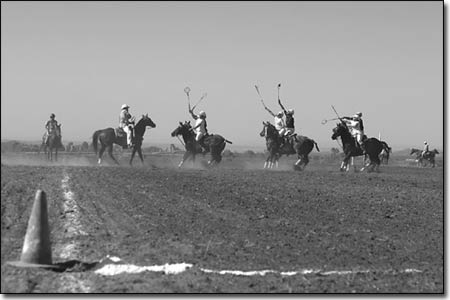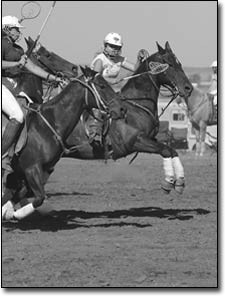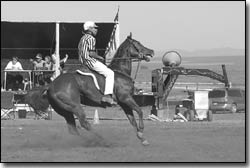|
Durango teens qualify for national
polocross squad
by Katie Sands
 |
| Teams battle for possession of
the ball at the polocross tournament in Wildcat Canyon
as a cone marks the corner
of the playing field./Photo by Todd Newcomer |
E xtended family members take seats under shaded picnic
benches next to the playing field. They exchange recent
news and the whereabouts of upcoming tournaments. Little
ones chase each other around parked cars, and the smell
of cooking hot dogs permeates the air. To a casual observer,
this may seem like an average Father's Day sporting event,
but as anticipation builds and the players return to
the field, the unique value of this up-and-coming sport,
polocross, is soon realized.
Leading their horses adorned with brightly colored tail
ribbons, the players, complete with headgear and lacrosse
sticks, separate into their respective teams. The teams
of six players each divide into sections of three players
and will each play a total of two, eight-minute quarters,
or "chuckas." Each of the three players has a specific
position; the first player attempts to score goals, while
the second acts as a mid-field defender and the third
as goal defender. The game, described as a cross between
polo and lacrosse, finds its origin in Australia where
it has been played for nearly 80 years. Although introduced
many times, it didn't receive complete U.S. attention
until the mid-80s.
After the whistle signals the third chucka, the ball
is immediately taken into the stick of a player wearing
a white jersey, only identifiable by the long blonde
hair sticking out from her helmet and her agile stance
on the horse. Within seconds she scores a goal, and the
local families cheer and applaud noting, "That's Ashley
Masters, the daughter of Wendi Hendricks who just made
the national team."
Wendi, who was playing on a team with Ashley and her
stepdaughter, Krii, for the Father's Day tournament,
said that she wasn't surprised that Ashley, 15, and stepson,
Dylan, 17, made the International Youth Exchange Program
team.
"They're extraordinarily talented kids who are probably
so good because we've played a long time as a family," said
Wendi.
 |
| Ashley Masters gets into position
as she plays
defense for her team Sunday morning./Photo
by Todd Newcomer |
Ashley and Dylan began playing competitive polocross
around the age of 7 or 8. Wendi, a member of the American
Polocross Association coaching team, said it isn't unusual
to see children start learning as young as 3. Ashley
and Dylan learned equestrian skills as they learned polocross
technique. Lisa Blue, Dylan's mother, said that having
great horse skills is crucial to becoming an accomplished
player.
"In polocross, the players have one horse, where in
polo there's a string of horses," said Blue. "There's
a lot involved in working with your horse and training
it to be an endurance athlete. Additionally, the rider
has to be damn good on a horse to play, which requires
several years of solid riding skills."
Ashley and Dylan's primary coaching has come from their
family, both their parents and grandparents, who share
numerous national and regional titles. They also benefit
from Wendi's experience at the first polocross World
Cup held last year in 4 Australia.
"Last April, Wendi was one of four women and four men
who went to Australia for the World Cup," said Judy Hendricks,
Wendi's mother-in-law, who continues to play polocross. "They
ended first in their division and fifth in the world."
Wendi Hendricks agreed that her time in Australia offered
new insight to the game.
"Polocross in Australia is like football to Americans," said
Hendricks. "Attending the World Cup was like going to
the Super Bowl; there were eight nations and over 40,000
people. It's important for me to transfer the information
from that experience to help others in their game."
With family support, polocross genes and reliable coaching
advice, Dylan and Ashley made their way to the national
team-qualifying competition in April in Austin, Texas.
The competition was monumental for Dylan, who had missed
qualifying by several points two years prior when his
sister, Krii, had made the team.
"From there on I made it a priority," said Dylan. "I
practiced two times a day, weight-lifted and always had
a ball and stick in my hand."
Additionally, Dylan had suffered a serious knee injury
last year at the Nationals in North Carolina when another
horse pinned him.
"I can't think of that when I play," said Dylan. "You
try not to get hurt even though you might get hurt. You
do what you can do to play the best you can and hopefully
it is your best."
Dylan and Ashley competed for a week against 19 other
teens with qualifying resumes and a background in polocross.
The competition tested horsemanship, game knowledge and
ball handling through using a different horse and saddle
during each chucka and playing a different position.
"Qualifying was really intense," said Ashley. "It was
a big competition with kids from all over the U.S. trying
out for one national team. It was nerve-wracking and
exciting at the same time."
After a grueling week of skill testing, Ashley and Dylan
succeeded in qualifying for the International Youth Exchange
Program. They left on June 23 for a week of training
in Texas.
"That's going to be the real crunch time," said Dylan.
 |
Dylan Hendricks, 17, referees the
morning's competition after an injury to his
horse left him sidelined./Photo by Todd Newcomer. |
Thereafter, Ashley will travel with two girls from Pennsylvania
to the UK where three girls from the UK will complete
their team, and Dylan, who is sponsored by Sunnyside
Farms, will travel to Australia with six boys from the
United States. Similarly, next year the United States
will host an international polocross exchange, in which
Durango will serve as a competition point.
For five weeks Dylan and Ashley will compete only to
return to the Nationals held in Wyoming. They also haven't
ruled out the possibility of the World Cup in four years.
"That's my next big goal," said Dylan. "It's what I
really want to do."
Wendi added that the American Polocross Association
is pushing for more polocross recognition nationally
and internationally.
"It's really starting to take off, but it's not as well
known because it's not played for money," she said. "The
American Polocross Association is trying to get a better
umpire program and along with Australia, we're working
to integrate polocross into the Summer Olympics."
Like Ashley and Dylan, Wendi has high hopes for the
future of American polocross.
"In the next World Cup we want to move fast and dominate," said
Hendricks. "We don't want to represent ourselves as a
team newly learning the sport."
|